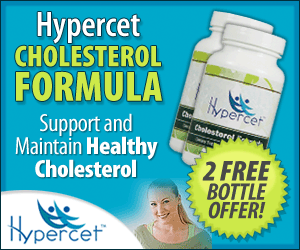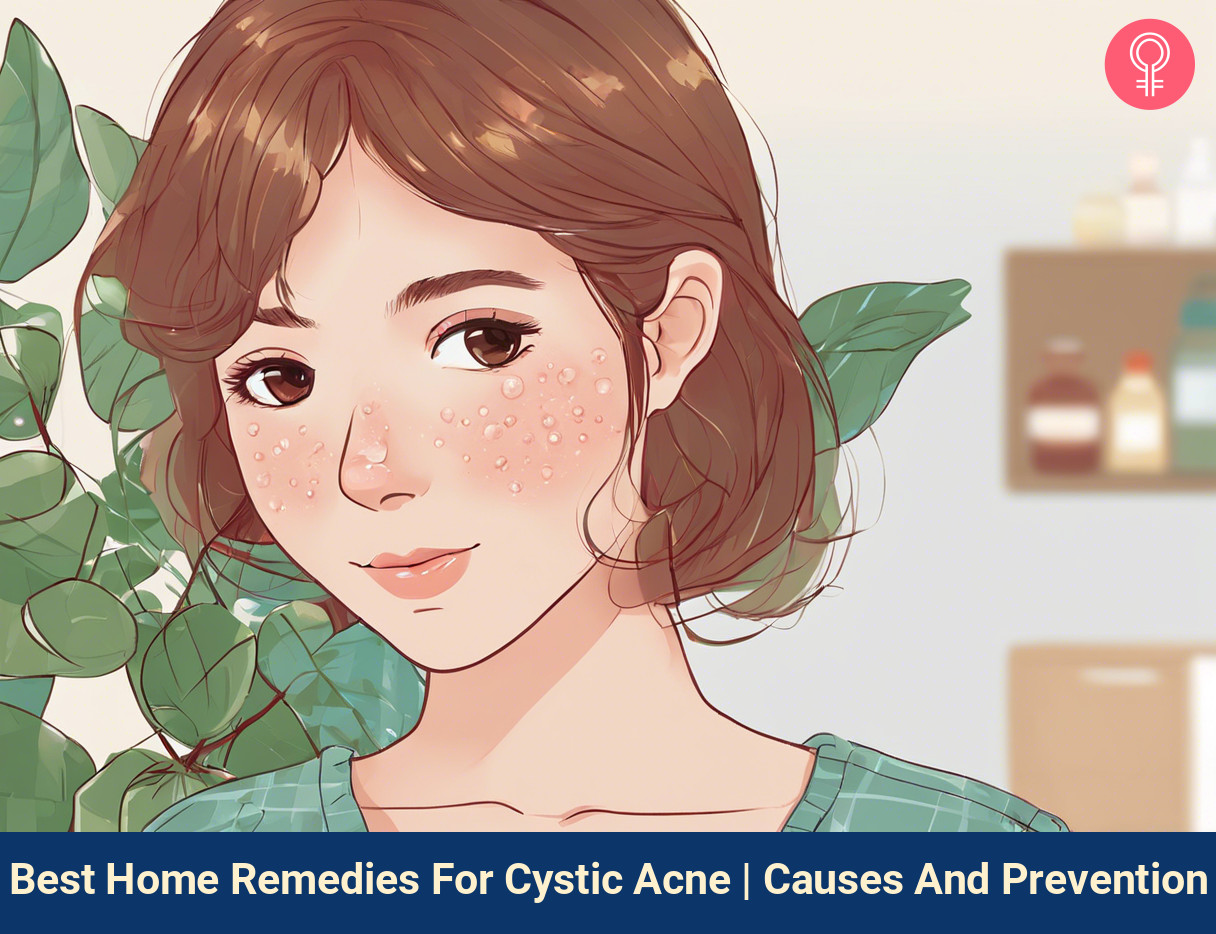Cystic acne is painful that needs clinical treatment. It is a serious problem of acne that may leave irreversible scarring marks and blemishes if you do not treat it on schedule. Though it is best to speak with a dermatologist i X A doctor with board qualification that is certified to identify and deal with problems of the skin, hair, and nails., you can additionally attempt some natural home remedy to manage this condition. These homemade remedies will help treat the inflammation and manage the irritation. This article discusses cystic acne, home remedies to treat it, and other treatment options available. Keep reading!
In This Article
How To Identify Cystic Acne
Cystic acne is a severe form of acne ( 1 ). It is a deep acne created in the skin and is larger than any type of other form of acne. The cysts have a smooth surface and show up a little bit shinier as a result of the rigidity of the skin. Cystic acne usually shows up on the face, neck, back, upper body, arms, and behind the ears. It is softer than nodular acne and occurs as unpleasant large pus-filled white bumps. It is also a very painful acne and one of the most extreme type of acne vulgaris. Inflammation and inflammation are other determining attributes of this problem. Cystic acne normally appear on the face, neck,
back, upper body, arms, and behind the ears. It takes place as excruciating large pus-filled white bumps. Redness and swelling are other identifying characteristics of this problem. Cystic acne usually leaves long-term deep pits ( ice pick scars ) or superficial depressions on the skin. Papules and pustules typically consist of pus as an outcome of a pore cavity infection. When this occurs, the pustule becomes a cyst.
From hormonal changes in puberty i X A developmental period characterized by physical and hormone modifications during which teens acquire sex-related maturity. to utilizing certain skin treatment products, a number of factors can activate cystic acne. Scroll to recognize even more regarding it!
Causes Of Cystic Acne
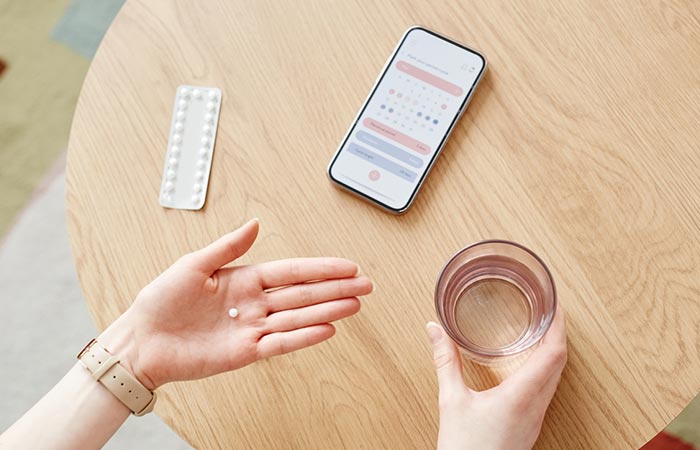
Acne is caused when dirt, impurities, sebum i X The oily secretion generated by the sebaceous glands that functions as a protective and lubricating layer for skin and hair., and microorganisms obtain caught in the skin pores, leading to inflammation . When the infection is deep, and the inflammation is severe, cysts or nodules are formed.
The hormonal changes in adolescence are a major factor behind cystic acne. High androgen i X A type of steroid hormonal agent, either artificial or natural, that controls the growth and upkeep of male attributes. levels may increase sebum manufacturing and trigger stopped up pores, trapping dirt and acne germs. Other elements that might set off cystic acne consist of:
- Hormonal fluctuation during pregnancy, menstrual cycle, and menopause i X A stage in the lives of females defined by a lack of menstruation and a reduction in sex hormone levels.
- Certain medications like corticosteroids i X A group of steroid hormones usually created in the adrenal cortex with metabolic or anti-inflammatory properties., contraceptive pill, hormone therapy
- Certain chemicals in skin care products
- Genetics and conditions like polycystic ovary syndrome ( PCOS i X A hormonal problem resulting in enlarged ovaries and little cysts on their outer margins that cause irregular menstrual cycle or acne.)
TriviaAcne is triggered by the microorganisms propionibacterium acnes, which breaks down sebum into toxic irritants that may cause inflammation, causing cysts ( 1 ).
Cystic acne is problematic and requires immediate interest and treatment. Locate a few of the best all-natural ways to soothe uncomfortable cystic acne listed below.
Home Remedies For Cystic Acne
Note: These remedies will not treat cystic acne. They may only help in soothing the inflammation.
1. Baking Soda
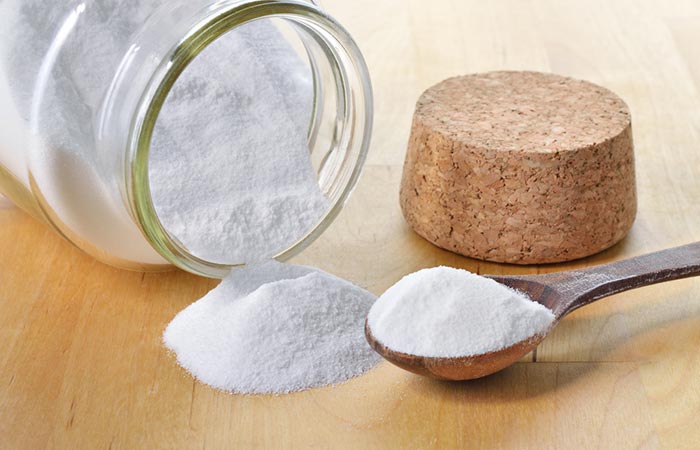
You Will Need
- 1-2 tablespoons of baking soda
- 1 tablespoon of water
What You Need To Do
- Mix the ingredients to form a paste.
- Apply it to the affected areas and leave it on for a minute.
- Wash it off with lukewarm water and pat dry.
- Follow up with a moisturizer.
How Often?
Once or twice a week.
Why This Works
Baking soda fights acne-causing bacteria and dries up excess sebum to reduce the inflammation ( 2 ). Apply the paste to the affected area in slow, circular motions.
Related: 20 Beauty Benefits Of Baking Soda You Must Know!
Quick TipInstead of baking powder, you can use a tablespoon of brown sugar, known for its exfoliating properties.
2. Apple Cider Vinegar
You Will Need
- 1 tablespoon of raw apple cider vinegar
- Cotton buds
- 1 tablespoon of water
What You Need To Do
- Dilute the ACV with water.
- Apply the mixture with the cotton bud as a spot treatment.
How Often?
Do this twice a day.
Why This Works
Apple cider vinegar is said to balance the skin pH , helping maintain its acid mantle i X A slim, a little acidic layer that secures human skin from germs and various other pollutants by functioning as an obstacle to their penetration. and calming the inflammation.
3. Epsom Salt
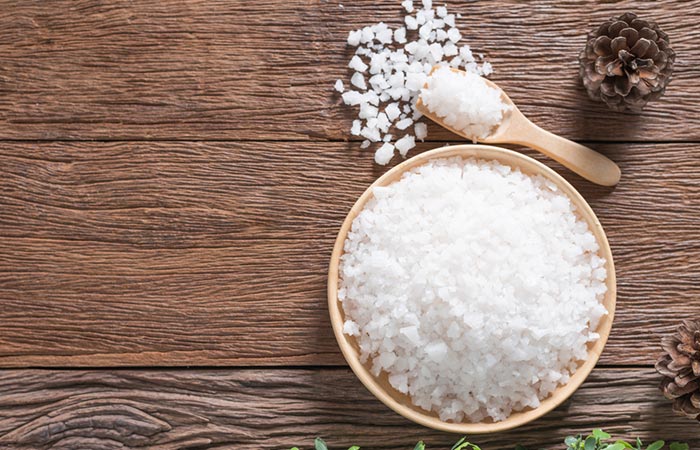
You Will Need
- 2 tablespoons of Epsom salt
- 1 ½ tablespoons of baking soda
- Warm water
What You Need To Do
- Mix the ingredients to form a paste.
- Apply it as a spot treatment to the affected areas and let it dry for a few minutes.
- Wash it off with warm water.
How Often?
Do this every alternate day.
Why This Works
Epsom salt has pain-relieving properties and is often used in traditional remedies. It may help reduce swelling and pain and provide relief . This remedy works best for oily to combination skin types.
Caution: The paste can dry the skin. Seek medical help if you experience irritation.
Related: 7 Benefits Of Epsom Salt, How It Works, And Side Effects Subscribe
4. Neem Oil
You Will Need
- 2-3 drops of pure neem oil
- Cotton pads
What You Need To Do
- Clean your face and apply neem oil with a cotton pad to the cystic acne.
- Leave it on overnight and wash it off in the morning.
How Often?
Do this two to three times a day.
Why This Works
Neem oil is used as an alternative remedy for acne ( 3 ). It may help reduce inflammation and redness associated with cystic acne.
Related: Neem Oil: Tips To Use It For Scabies Treatment
Quick TipYou can use essential oils from rosemary, orange, thyme, and grapefruit to manage acne ( 3 ).
5. Witch Hazel
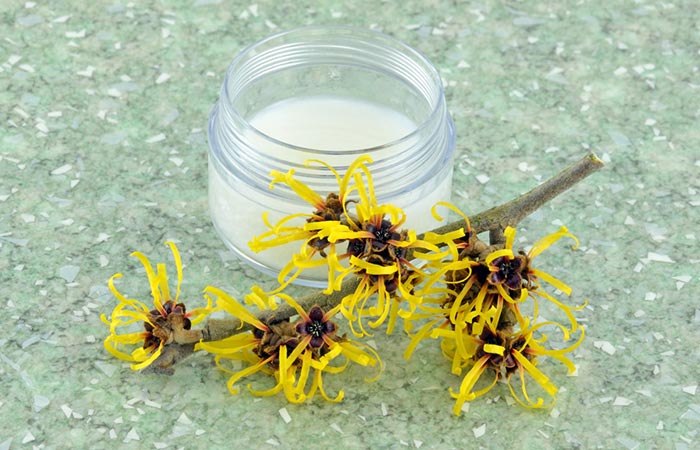
You Will Need
- 1 teaspoon of witch hazel
- Cotton ball
What You Need To Do
- Dab the cotton ball soaked in witch hazel on the cleansed affected areas.
- Leave it on.
How Often?
Use it twice or thrice every day as a toner after you wash your face.
Why This Works
The antiseptic and astringent i X A building or active ingredient that permits the skin's cells and body cells to acquire to make skin much less oily or maintain cuts from blood loss. properties of witch hazel can soothe acne and reduce swelling ( 4 ).
Michelle Montoro, a blogger, reviews the skin problems she faced throughout menopause, specifically cystic outbreaks that instantly showed up on her skin just in her 40s. A treatment she discovered useful was flaxseed oil. She composes, "I have actually been depending on flaxseed oil to treat my cystic skin swelling. I noticed an immediate reduction in the inflammation of the deep cysts on my face. Like within days. And the itchiness disappeared as well which additionally brought about a reducing of the redness and irritability on the surface of my skin ( i ).”
Natural home remedy might just aid take care of the inflammation and inflammation. You need proper acne therapy for cystic acne. Look into the non-prescription therapy techniques available for cystic acne below.
Related: 24 Amazing Witch Hazel Benefits, How To Use, & Side Effects
Treatments Options For Cystic Acne
1. Retinoids And Isotretinoin
Retinoids and isotretinoin are vitamin A derivatives and potent prescription acne medications for cystic acne ( 5 ), ( 6 ). These are usually available in the forms of creams, lotions, and ointments.
Doctors frequently recommend oral Accutane for dealing with serious cystic acne. Nonetheless, prevent taking this if you are pregnant, as it might trigger abnormality. Various other potential negative effects consist of mood problems, liver problems, completely dry eyes, blood in urine, raised skin sensitivity to the sun, and muscle mass or joint pains ( 7 ). Hence, talk about all possible side effects with your doctor before starting the medication.
2. Oral Antibiotics
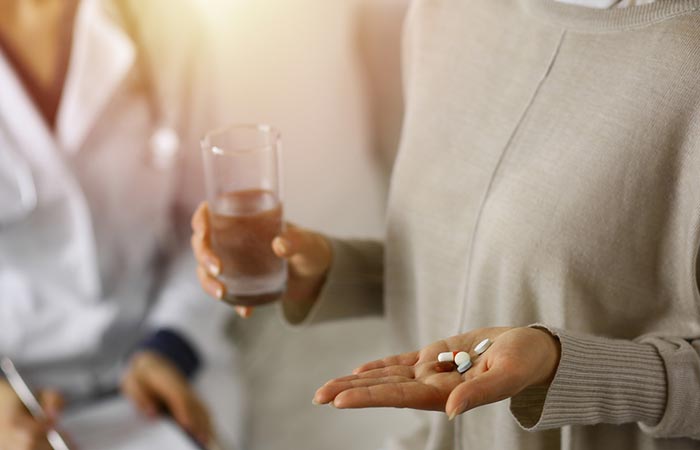
Dental prescription antibiotics can deal with serious inflammatory acne. These are often incorporated with topical retinoids and benzoyl peroxide to reduce inflammatory and comedonal lesions.
Prescription antibiotics like tetracyclines (doxycycline and minocycline) and macrolides (azithromycin and erythromycin) have antibacterial impacts and minimize the spreading of acne-causing germs ( 8 ). Oral anti-biotics also create some adverse effects, consisting of sun sensitivity, throwing up, stomach pain, diarrhea, and nausea or vomiting. Consult your medical professional before utilizing them.
3. Spironolactone And Corticosteroids
Spironolactone is a steroid utilized for treating serious acne. Researches discovered that a dosage of 50 to 100 mg each day could decrease excess sebum manufacturing and lower swelling ( 9 ).
Spironolactone and corticosteroids can regulate excess androgen levels and reduce acne inflammation. This treatment is often prescribed for treating hormonal acne . However, it may cause breast enlargement in men ( 10 ). Also, if you are pregnant, consult a doctor before taking steroids and spironolactone.
4. Oral Contraceptives
Contraceptive pills are a sensible option for regulating hormone variation and acne. Contraceptive pill balance estrogen degrees, lower androgen levels, and minimize sebum manufacturing to decrease acne ( 11 ). However, these are not suitable for everyone.
Avoid contraceptive pills if you smoke, have embolism concerns, or attempting to get expectant. Women may experience negative effects like breast tenderness, increased genital discharge, stomach cramping, queasiness, and migraines ( 12 ). It may rarely cause adverse effects like blood clots and heart attacks, especially in women over 35 years.
5. Benzoyl Peroxide
Benzoyl peroxide is offered as cleansing liquids and bars, lotions, lotions, and gels. It is a bactericidal, keratolytic (breaks down outer layers of skin), and comedolytic (avoids comedone formation) representative. It likewise has anti-inflammatory properties that lower acne-causing microorganisms and prevent brand-new sores ( 13 ), ( 14 ).
Alcohol-based formulations of benzoyl peroxide have a drying out effect, making them appropriate for oily skin. However, too much use of benzoyl peroxide might cause skin irritation.
Aside from systemic therapies and home remedies, you may attempt comedone removal to reduce swelling. Ice therapy might also provide short-lived alleviation and decrease pain. Look into the adhering to pointers to aid you stop or lower the risk of worsening your acne.
How To Prevent Cystic Acne
- Clean your face two times a day. Prevent making use of harsh scrubs, strong cleansers, and soaps. Utilize a mild cleanser in the morning and before sleeping. Rinse your confront with lukewarm water.
- Wear sunscreen to prevent sunburns and tanning.
- Avoid touching, scratching, and rubbing the acne lesions.
- If you have an oily scalp, shampoo your hair regularly.
- Use non-comedogenic i X A skin care component or aesthetic targeted at reducing acne and its associated symptoms without obstructing skin pores. and oil-free skin care products.
Acne cysts are often assumed to be the same as nodules. Nevertheless, both are noticeably various. Find out more in the following section.
Acne Cyst Vs. Nodule
Acne cysts and nodules are both severe, painful forms of acne that can be challenging to treat.
Cystic acne can trigger big, deep cysts that feel soft to the touch and are commonly associated with inflammation and scarring. They might create considerable discomfort and pain.
Blemishes, on the various other hand, are strong, dome- or irregularly-shaped sores that create deep within the skin. They are often larger than normal acnes. They also can be fairly sensitive or unpleasant to the touch ( 15 ).
Both cysts and blemishes can last for weeks and even months and are normally resistant to over the counter therapies. Their efficient management warrants the aid of a skin specialist. Obtaining the ideal therapy is important to protect against long-lasting scarring and skin damages.
Infographic: 3 Natural Ways To Treat Cystic Acne
Cystic acne can be unpleasant and is caused by hormone inequalities and PCOS (polycystic ovary syndrome). The inflammation and marks brought on by it might not go away conveniently. The good news is that you can use easy kitchen area components to aid handle the signs and symptoms and appearance of cystic acne. Have a look at the infographic listed below to recognize more.
Illustration:
Get the high-quality PDF version of this infographic.
Cystic acne is various from the typical acnes you get. It is a serious type of acne that needs clinical therapy. You may also consist of serums containing salicylic acid, glycolic acid, and tea tree oil in your skin treatment regular to get rid of cysts.
Otherwise, it might leave long-term marks on your face. Hormonal adjustments, drugs, particular skin treatment products, genetics, and PCOS might create cystic acne. The natural home remedy talked about in the article might help you calm cystic acne and soothe the skin. You might additionally consult your skin doctor to identify the hidden medical condition to figure out which therapy matches you the most effective.
Frequently Asked Questions
Can you pop cystic acne?
No. Popping cystic acne can introduce more bacteria into the pore, worsening the infection.
Does cystic acne go away?
No. Cystic acne may improve with treatment, but it won’t go away.
How long does cystic acne last?
With correct treatment, you might expect cystic acne to boost by 8-12 weeks. However, the recuperation depends upon the seriousness and might leave marks.
Does stress cause cystic acne?
Yes. Stress can trigger your oil glands and cause an acne flare-up ( 1 ).
Key Takeaways
- A severe kind of acne that materializes as undesirable, large bumps, loaded with white pus is referred to as a cystic acne.
- Many skincare products, genetics, hormonal issues, PCOS, and drugs can cause this condition.
- Natural and effective remedies such as neem oil, witch hazel, and Epsom salt can relieve the irritation and swelling.
- It is a good idea to wash and clean your face two times a day and use oil-free skin treatment items to stop cystic acne.
Wish to do away with stubborn breakouts and attain clear skin? Click on this video clip to find out how to treat cystic acne with easy yet efficient pointers for a positive you.


